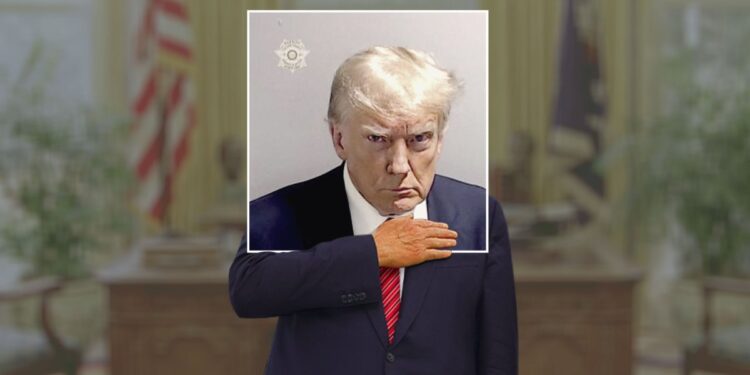The American people have spoken. Donald Trump is the 47th president of the United States.
At noon Monday, Trump himself spoke, swearing—not especially credibly—that he would “preserve, protect and defend the Constitution.”
A lot of other Americans spoke to get us here, too. More than four years ago, at the very same Capitol where Trump was just sworn in, his supporters spoke. “Hang Mike Pence,” they said.
Just three weeks later, Kevin McCarthy, the top House Republican, spoke, journeying to Mar-a-Lago to talk directly to the disgraced former president and to pose obsequiously for the cameras.
Sen. Mitch McConnell spoke after Trump’s second impeachment trial, declaring that Trump’s actions had been a “disgraceful dereliction of duty.” But the Senate minority leader kept speaking. He insisted that the Senate no longer had any power to convict Trump or to bar him from once again seeking office. Forty-two of McConnell’s Republican colleagues spoke in agreement, voting to acquit Trump and to allow his political career to continue.
Trump, of course, never stopped speaking, and he soon announced another run for president.
Then, in quick succession, the prosecutors all spoke. Merrick Garland announced he was appointing Jack Smith, who produced two speaking indictments against the former president. Manhattan District Attorney Alvin Bragg spoke, charging Trump with 34 felonies that may, or may not, have actually been felonies. “This office upholds our solemn responsibility to ensure everyone stands equal before the law,” Bragg declared. In Georgia, Fulton County DA Fani Willis spoke, charging Trump and his cronies in a 98-page RICO indictment.
The Colorado Supreme Court spoke, declaring Trump ineligible to run for president. The US Supreme Court spoke, and—unanimously—said the Colorado court was wrong. So then Republican primary voters spoke, choosing Trump as their nominee.
New York judges and juries spoke—declaring Trump liable of sexual abuse, defamation, and fraud, and convicting him in Bragg’s criminal hush-money case—but voters seemed not to be listening. In Georgia, a judge spoke, blasting that state’s prosecutors’ “tremendous lapse in judgment” and “odor of mendacity” in a ruling that would ultimately derail Trump’s trial there. SCOTUS spoke once again, awarding Trump broad immunity and sending Smith back to the drawing board. In Florida, Judge Aileen Cannon spoke, announcing that Smith’s appointment was, somehow, invalid from the very beginning.
In the meantime, another special counsel, Rob Hur, had spoken, explaining that he wasn’t going to charge Joe Biden with crimes because, in part, Biden seemed to be “a sympathetic, well-meaning, elderly man with a poor memory.” Biden’s supporters very much did not want to listen to that—at least until Biden himself spoke at a debate and removed all doubt.
Kamala Harris spoke, and briefly restored joy. But she’d spoken before, telling voters that “Bidenomics is working.” Voters disagreed, and they disagreed even more when Harris said there was “not a thing that comes to mind” that she would have done differently than Biden.
Even as Biden seemed to slowly disappear, he, too, kept speaking—at times in ways that were nearly impossible to comprehend. “We gotta lock him up,” Biden said about Trump. “Politically lock him up. Lock him out.” Days later, Biden called some number of Trump’s supporters “garbage.” Then Biden’s staff spoke about apostrophes, while Trump rode around in a garbage truck.
On Election Day, the voters finally spoke, and a plurality said that Trump should return to the White House. Most notably, the people of Pennsylvania, Michigan, Wisconsin, Georgia, Nevada, and Arizona all spoke, supporting the former president whom they’d rejected four years earlier.
Smith spoke again, conceding that his cases against Trump were officially over.
In New York, Bragg—along with Judge Juan Merchan—pushed on, but there was little left for them to say. With SCOTUS’s blessing, Trump’s hush-money sentencing went forward. Sort of. Merchan granted the incoming president an “unconditional discharge,” allowing him to return to the White House with no criminal punishment whatsoever.
Which brings us back to Inauguration Day.
“The scales of justice will be rebalanced,” Trump said to applause, shortly after taking the oath. “The vicious, violent, and unfair weaponization of the Justice Department and our government will end.”
We’ll soon discover whether he was speaking truthfully.







